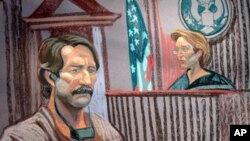Douglas Farah's book is called "The Merchant of Death" -- a reference to Viktor Bout's suspected vast arms trafficking activities.
Farah says Bout was a Soviet Air Force officer who saw the potential of selling weapons internationally as the Cold War came to an end.
"And as the Soviet Union ended, he seemed to have a vision that no-one else did, and that was that there were massive amounts of weapons in arsenals where the troops were no longer being paid, officers weren't being paid, and [the weapons were] available for a relatively cheap price," said Farah. "And there were aircraft left on the tarmacs across the former Soviet bloc that weren't being able to be flown because there was no money for fuel or maintenance. And he sort of married up those two commodities and began flying weapons and aircraft out of the Soviet Union and doing business across the world."
Farah gives some examples of Bout's alleged arms trafficking activities.
"The United Nations, the United States, the British and others have accused him of flying weapons into Liberia and Sierra Leone, particularly at the height of the very brutal wars in West Africa. He dealt extensively with the UNITA rebels in Angola," said Farah. "He had a relationship with Mobuto Sese Seko in what was Zaire, now the Democratic Republic of Congo. But he was also in the same conflict arming the rebels that came to power under Laurent Kabila. So he's been around many sides of different conflicts."
Bout's biographer says the accused arms trafficker did not provide weapons to al-Qaida, but that he did have extensive dealings with the Taliban in Afghanistan.
"In part because one of his aircraft that was flying to deliver weapons to the Northern Alliance had to land in Taliban territory. They took the ammunition and kept some of his men prisoner for about a year. And then suddenly they were freed and he began supplying both ammunition and eventually aircraft to the Taliban," Farah said.
For two decades, Bout allegedly supplied weapons to anyone who would pay him. At the same time, he eluded international authorities.
Farah says Bout was finally arrested in Thailand in 2008 in a sting operation run by U.S. Drug Enforcement Administration agents posing as members of the Revolutionary Armed Forces of Colombia, or FARC guerilla movement.
"And over a series of meetings and telephone conversations with him, they eventually set up a meeting in Bangkok, where he would sort of finalize the deal. And he offered them, at the meeting in Bangkok, surface-to-air missiles, drones to attack U.S. installed radars and that sort of thing, and specifically said that he knew that the weapons will be used to kill Americans," said Farah. "And because the FARC is a designated terrorist organization, that is enough to put him away for a long time."
On Tuesday (11/16/10), Bout was extradited to the United States from Thailand after a two-year legal battle. He says he is an innocent businessman and not involved in arms trafficking -- a claim echoed by Russian officials.
In a statement, the Russian Foreign Ministry called the extradition "illegal" and promised that Moscow would provide Bout all of the assistance entitled to Russian citizens abroad.
Farah says Bout has influential friends in Russia's intelligence agency.
"They are very anxious to protect him -- one, because they wanted to and two, because of what he knows," he said.
Farah says Russian officials are concerned about what Bout could tell U.S. authorities.
"I think he could tell them a great deal about what the Russians are doing in weapons sales around the world and how their intelligence structure works. Yes, I think that should be of concern to them and probably is," he added.
But Farah says other people are also concerned about what Bout might reveal under interrogation.
"Viktor also flew for the U.S. in Iraq; he flew for the British; he flew for the United Nations. One of the things that made him so unusual was that he would fly virtually anything, anywhere where the cargo needed to go. So he flew gladiolas, U.N. peacekeepers, frozen chickens, AK-47s -- pretty much for anyone who would pay. And I think many people would be happy if we didn't go into his long history," Farah said.
Appearing in federal court in New York City this week, Viktor Bout pleaded not guilty to terrorism charges.
Suspected Russian Arms Dealer Holds Many Secrets, says Expert











